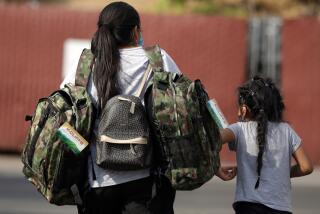The Blood of Everyday Heroes
- Share via
Supplies of emergency blood are dangerously low in Southern California and throughout the country. Yet, unlike so many health care crises that make newspaper headlines, ordinary people can do something about this one. We may not be able to fix the nursing shortage or rein in the price of prescription medicine. Many of us, however, can donate blood.
The Los Angeles office of American Red Cross Blood Services got 80 calls from people wanting to do just that after The Times ran a front-page story Sunday on the shortage.
Now comes the challenge of making this generous impulse a habit. Blood shortages were once seasonal. Today, demand outstrips supply year-round. Local hospitals already routinely postpone non-emergency surgeries if blood is short. Demand has risen, in part, because of life-saving technologies that use more blood. Supply has fallen with the deaths of regular donors; the World War II generation began giving blood as an act of patriotism and kept the habit. The Red Cross and the U.S. Food and Drug Administration have also increased curbs on who can give blood to prevent transmission of HIV, hepatitis--and now mad cow disease, barring anyone who has spent at least three months in Britain or six months in Europe since 1980.
These restrictions are even more reason to give blood for the estimated 60% of the population nationwide still eligible. Of this group, only about 5% donate. We don’t have a war--thankfully--to stir us to donate blood. But we do have a rare chance to take effective action.
There’s a story about World War II blood drives in which donors were encouraged to sign their names to bags of blood. A soldier donated just before he was shipped off--and recognized his signature on a bag of blood used to treat him after he was wounded. We can’t vouch for the story. But the lesson holds true.
To take action: Call the Red Cross at (800) GIVE-LIFE or (800) 879-4484 in Riverside and San Bernardino counties.


